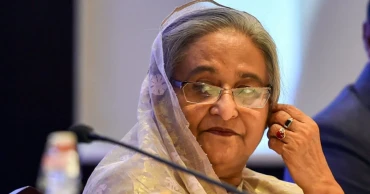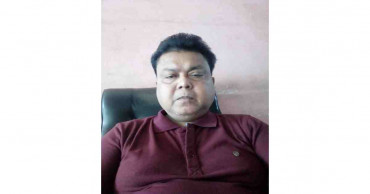Digital Security Act (DSA)
We have taken DSA criticism into consideration: Law Minister
Law, Justice and Parliamentary Affairs Minister Anisul Huq said on Tuesday the government will consider updating the Digital Security Act (DSA) if needed.
“We are taking the criticism into consideration. The law was enacted for ensuring digital security, we will hold onto this aim,” he said.
The minister sat in a meeting with the representatives of civil society when the parties discussed this law criticised by many terming it draconian. Many say the DSA is regularly used to harass people.
“We discussed their concerns about the DSA. We will also talk about the Data Protection Act. We will again sit to discuss the laws,” he added.
Both parties agreed to have another meeting on the DSA on March 30.
Read more: Govt to sit with stakeholders on possible changes to DSA: Law Minister
TIB Executive Director Dr. Iftekharuzzaman said they demanded the abolition of the DSA.
“We pointed out our concerns about the DSA. There is no chance to make the DSA acceptable. The law minister also talked about the misuse of this law. We think this law should be abolished,” he added.
They will discuss the new draft of the Data Protection law in another meeting on April 6.
“We would like to see the new draft positively. The government has given us an opportunity to review the draft. We hope they will consider suggestions,” said Iftekharuzzaman.
Dhaka University International Relations Prof Dr CR Abrar, Supreme Court lawyer barrister Jyotirmoy Barua, academic and activist Rezaur Rahman Lenin, rights activist Md Saimum Reza Talukder, and Sharmin Khan, were present, among others.
2 years ago
PM in Washington: Media in Bangladesh free to criticize govt
Prime Minister Sheikh Hasina has said that Bangladesh’s growing media during her tenures has the freedom to say whatever they wish to say.
“After saying everything, if someone says that he/she is not allowed to speak, what would be the answer? That’s what I’d like to know,” she said in an interview with the Bangla service of Voice of America (VoA), aired on Tuesday.
Read:“Not possible for us to take any more people, Rohingyas must go back”
The prime minister was responding to a question on Digital Security Act (DSA) enacted by her government and its impact on freedom of media. She is now in Washington, on a visit to the United States.
She said that Bangladesh had only a few TV and radio stations before she came to power in 1996 and those were controlled by the government.
PM Hasina said once she came to power, she made an opening for the private sector to run media houses freely.
Read: Hasina and Friends: Interactive gaming platform to educate children
She said 32 private television channels are now operational among the approved 44 TV channels.
The prime minister said people are taking part in television talk shows and they speak freely – true or false – and they criticize the government.
She said there was no freedom of speech or movement during the military dictatorship.
3 years ago
Cases under DSA decline: Law Minister
Law Minister Anisul Huq on Tuesday said cases under the Digital Security Act (DSA) are decreasing in the country due to the government initiative.
The law enforcers are not arresting the accused in a hurry and they are also not talking about the cases under DSA directly. Cases under the DSA are sent to the special cell, he said.
Also read: Govt enacted DSA to prevent cybercrime: Law Minister
Anisul Huq was speaking at a dialogue on the ‘Mass Media Employees Act, Digital Security Act, and Data Protection Act’ organised by Bangladesh Secretariat Reporters Forum (BSRF) at the Secretariat media centre. In response to a question about the progress in the government’s assurance to amend the much-criticised DSA, the minister said, “We held a meeting with the United Nations High-Commission for Human Rights Office in 2019 in Geneva through the UN Resident Coordinator in Bangladesh. In the meeting, we have taken a decision to form two separate committees. The committees will recommend to us the best practices in the world and we will accept those which will fit Bangladesh. We have already formed a committee led by the legislative secretary.”
This committee sat in a meeting and will meet once again very soon, he added.
Claiming that DSA is not aimed at obstructing free journalism in the country, Anisul said, “Technology has improved in the country. We have to face the disadvantages of technology. DSA has been formed to face this challenge. A committee has been working to stop the misuses of the act and misuses will surely be stopped in the future.”
“We want to assure all that Digital Security Act has been made to combat the cybercrimes. The government of Sheikh Hasina will not form any kinds of law which will bar freedom of the press,” he asserted.
About the proposed Data Protection Act, Anisul said, he was told of its advantages and disadvantages by a team of Metropolitan Chamber of Commerce and Industry informed.
He said he discussed the issue with the state minister for ICT. The state minister assured that the proposal will be reviewed.
Also read: US envoy discusses DSA with law minister
Anisul defended the government move to enact a law for the mass media employees.
He said journalists may demand corrections in the proposed law instead of cancelling it.
BSRF president Tapan Biswas presided over the dialogue while its general secretary Masudul Haque moderated it.
3 years ago
BNP to revoke DSA, all other ‘repressive’ laws if returns to power: Fakhrul
BNP Secretary General Mirza Fakhrul Islam Alamgir on Sunday categorically said their party, if returns to power, will revoke all ‘repressive’ acts and ordinances, including the Digital Security Act (DSA).
Speaking at a views-exchange meeting with journalists, he also said their party will ensure the implementation of the Wage Board for journalists and media employees and empower the Press Council if their party forms government in the days to come.
“We would like to clearly say that if we form the government, all the repressive acts and ordinances those are obstacles to the independence of the media will be annulled,” the BNP leader said.
BNP arranged the programme titled, ‘Media Control Laws in Annihilating the Media: Bangladesh Perspective’ at the Jatiya Press Club. Former BNP MP and its executive committee member Jahiruddin Swapan presented the keynote paper.
Fakhrul said their party believes that it is not possible to give democracy an international shape without the independence of the media. “BNP has been working towards that goal since the rule of late President Ziaur Rahman.”
Also read: BNP won’t join talks with current EC: Mosharraf
He said the current government has enacted various laws, including the DSA. “These laws are like putting a nail in the coffin of media freedom.”
The BNP leader said regulating the media is probably now one of the biggest problems in the world, especially in Bangladesh. "As we celebrate the 50th anniversary of Bangladesh's independence, we are saddened to see that the media is being completely controlled." Those who want to write freely and express their opinions freely, can't do it now. Moreover, they’re being subjected to different types of repressions and threats and they are facing obstacles to performing their professional duties.”
He alleged that the government has been controlling the fundamental issues of democracy in a planned way one after another since it came to power. In doing so, they have thought the media must be controlled first.”
The BNP leader also said almost every media outlet of print and electric and the social media platforms are controlled by the government's intelligence agencies. “Their surveillance has reached such a level that which journalist is talking to whom or meeting whom or who are meeting an editor are being monitoring by the agencies.”
“Laws are now enacted to completely regulate the media…it hurts me a lot when I see journalists are not able to write and the editors are being threatened in various ways. In fact, the courage of the journalists is being taken away through this,” he observed.
Under such circumstances, Fakhrul said all should raise their voice to restore the press freedom.
He said it will be ensured, if BNP returns to power, that no matter what is published in the media, the aggrieved person or organisation cannot file a case in the court without resolving the issue in the Press Council that will be reconstituted with more power.
Also read: BNP urges govt to drop expensive megaprojects to avert economic crisis
Besides, the BNP leader said their party will take steps for ensuring a fair distribution of advertisements to make the media self-sufficient. “BNP is also thinking of giving financial incentives to the media on the basis of a certain number of circulations and TRPs.”
Stating that the entire nation is now in danger, he said a strong unity of people all walks of life is now necessary to restore democracy in the country and defeat the ‘fascist’ regime.
Fakhrul is confident that there will be a change in power in the country through the next national election, "We are very optimistic as the people of Bangladesh have never been defeated. We’re not excited seeing the light at the end of the tunnel as we’ve always been working to establish democracy.”
Speaking at the programme, Prothom Alo joint editor Sohrab Hassan expressed solidarity with the commitments of BNP to ensure media freedom.
“We can try to be reassured. But our past experiences don’t suggest us to be reassured…No government was newspaper or media-friendly since independence,” he said.
He said politicians have the responsibility alongside the journalists to remove the barriers to the freedom of expression and raise voices against the repressive laws and repression against the journalists.
“We surely want the support of the opposition in removing the obstacles to free press and the freedom of expression. But at the same time, I would like to issue a warning so that the same thing should not happen if they come to power,” the senior journalist said.
He said the Awami League government has enacted a repressive and autocratic law, the Digital Security Act. “I condemn it and demand its withdrawal."
Sohrab recalled that Awami League amended the ICT Act that was enacted during the BNP regime. “Awami League has increased the punishment through the amendment.”
Senior journalists and current and former leaders of pro-BNP factions of BFUJ and DUJ participated in the discussion.
3 years ago
Nigerian female prisoner dies at Dhaka hospital
A Nigerian female inmate of Kashimpur Women's Central Jail died at Dhaka Medical College Hospital on Friday afternoon.
The deceased was identified as Chidimma Abelf, 26.
Read: Prisoner dies at DMCH
Halima Khatun, senior jail super of Kashimpur Women's Central Jail, said Chidimma was taken to Gazipur Shaheed Tajuddin Ahmed Medical College Hospital on March 16 after falling ill.
Later she was shifted to Dhaka Medical College Hospital on Thursday as her condition deteriorated where she died while undergoing treatment on Friday, added jail super Halima.
Chidimma Abelf had been lodged in the Kashimpur jail after being arrested in a Digital Security Act case filed against her, she added.
3 years ago
Cartoonist Kishore, 6 others indicted in DSA case
A tribunal on Sunday framed charges against seven people including cartoonist Ahmed Kabir Kishore in a case filed under the Digital Security Act (DSA) on charges of spreading rumours and carrying out anti-government activities.
Dhaka Cyber Tribunal Judge Ash Shams Jaglul Hossain framed the charges and fixed April 7 for starting the trial.
Read:Cartoonist Kishore to file no-confidence petition against PBI report
Six other accused are ‘Rastrachinta’ activist Didarul Islam Bhuiyan, Shamiul Islam Khan alias Zulkarnain Saer Khan, former managing director of BLE securities Minhaj Mannan Emon, Netra News Editor Tasneem Khalil, Ashik Imran and Wahidun Nabi.
Police on June 14, last year, submitted a supplementary charge sheet against seven people, including Kishore in the case.
Afchhar Ahmed, Counter Terrorism and Transnational Crime unit (CTTC) sub-inspector and also the investigation officer of the case, submitted the charge sheet to the Dhaka Chief Metropolitan Magistrate's court.
However, Afchhar dropped the names of four others including US-based journalist Shahed Alam, Germany-based blogger Asif Mohiuddin, and some Philip Schuhmacher due to lack of enough evidence against them in the case.
Read: No evidence of torture on cartoonist Kishore found: PBI
The name of writer Mushtaq Ahmed, the main accused in the case, was dropped following his demise.
In February, police submitted a charge sheet against three of the accused, dropping the names of eight others.
Later, a Dhaka court ordered the DMP CTTC unit to further investigate all the 11 accused in the case.
May 6 last year, RAB filed the case against the 11 people with Ramna police station under the DSA.
4 years ago
DSA being used against opposition, dissidents: BNP
BNP on Sunday alleged that the Digital Security Act (DSA) is being used against opposition leaders and activists and dissidents as a tool of repression.
"The Digital Security Act is a repressive law. If anyone belonging to opposition or any dissenter files a case under the act in the morning, it will be dismissed by the court in the afternoon,” said BNP senior joint secretary general Ruhul Kabir Rizvi.
Read: Dialogue's focus on election 'manipulation', alleges BNP
Speaking at a doa-mahfil-cum discussion meeting, he also said when any Awami League leader files a case against a BNP leader under the DSA, the legal process continues smoothly from the very beginning. “That BNP leader will be arrested by police and sent to jail by the court.”
Rizvi also said if the BNP leaders are sent to jail under the DSA case they will be granted bail after a long time. “This is how the Digital Security Act has been applied in the country.”
Jatiyatabadi Online Activists arranged the programme on the ground floor of BNP’s Nayapaltan central office seeking eternal peace of the departed souls of their late colleagues, including MM Obaidur Rahman, Kamarul Hasan Shaheen, Tanima Soma and Shant Islam.
Describing the current situation in the country as "terribly suffocating", Rizvi said, "We live in a society where there is no freedom of speech. We have to always carefully look left and right all the time to see whether anyone is following us.”
4 years ago
It’s President’s jurisdiction to appoint CJ: Law Minister
Law Minister Anisul Huq on Wednesday said the President is the sole authority to appoint the Chief Justice. “In Bangladesh, the President has the authority to appoint the Prime Minister and the Chief Justice without asking anyone else. The President will appoint the Chief Justice whom he will deem fit for it. I think those who’re now in the Appellate Division are all fit for the post.” The law minister came up with the remarks while responding to a question from reporters about the appointment of the Chief Justice at a programme of Crime Reporters Association of Bangladesh (CRAB) in the capital.
Read: Law minister urges NHRC to stand against violation of human rights Replying to a question about the formation of the Election Commission (EC), the minister said, “The tenure of the EC will expire in February next year. The process for the formation of the EC has started and it’s under the jurisdiction of the President.” Responding to another question about allowing BNP chief Khaleda Zia to go abroad for treatment, the minister said the case in which Khaleda Zia got jail term was filed by the caretaker government, not the Awami League government. “Already, Khaleda has been released under section 401 of the Code of Criminal Procedure (CrPC) on some conditions, now there’s no scope to reconsider her release. She has to go back to jail first and file a plea to the government,” he said. “Khaleda was released under section 401 of the CrPC and Prime Minister Sheikh Hasina approved her plea on humanitarian grounds. The plea was disposed of and there is no scope to reconsider the disposed plea and you (journalists) know the government can’t do anything against the law,” he said.
4 years ago
EU voices concern over some DSA provisions
The European Union (EU) has raised the Digital Security Act (DSA) issue, expressing worries that some of its provisions risk going beyond the stated purpose of fighting digital crimes.
It also enquired about certain ongoing trials in this context and encouraged Bangladesh to implement the recommendations made during the last Universal Periodic Review.
Read: Rohingya Crisis: European Commissioner due Tuesday
The EU and Bangladesh met for their fourth Diplomatic Consultations in Brussels recently and discussed the issues.
4 years ago
Kushtia journo held under DSA for defamatory post against PM
A journalist was arrested in Kushtia on Tuesday under the stringent Digital Security Act (DSA) for allegedly sharing a "defamatory" social media post against the Prime Minister.
Farhad Asif Tipu, 50, son of late Amir Uddin of Batikamara village of Kumarkhali upazila, is the Kushtia correspondent for Daily Jay Jay Din.
Read:Rangpur: 1 arrested in Joypurhat under DSA, 42 for arson
Police said Farhad shared on Facebook a defamatory post with a distorted image of the Prime Minister from his own page on the social media platform. It was originally posted on Facebook by someone else.
The arrest comes on a complaint from Kumarkhali Upazila Juba League organising secretary Farhad Imran. Based on the complaint, an FIR was filed against Farhad under the Digital Security Act at the Kumarkhali police station.
Read: DSA: Order on Jhumon Das’s bail plea Thursday
Kamruzzaman Talukder, officer-in-charge of the Kumarkhali police station, said they had arrested the journo based on the complaint.
4 years ago





.jpg)

 (1).jpg)
.jpg)




